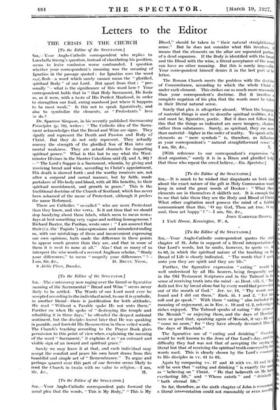[To the Editor of the SPECTATOR.] SIR,—The controversy now raging
over the literal or figurative meaning of the Sacramental " Bread and Wine " seems never likely to be settled. The Words of our Lord must ever be accepted according to the individual mind, to one it is symbolic, to another literal—there is justification for both attitudes. We read " Without a Parable spake He not unto them." Further on when He spoke of " destroying the temple and rebuilding it in three days," he offended the deepest national sentiment, but the disciples learnt later that He was speaking in parable, and foretold His Resurrection in these veiled words. The Church's teaching according to the Prayer Book gives permission to this point of view when, explaining the meaning of the word " Sacrament," it explains it as " an outward and visible sign of an inward and spiritual grace."
Surely we may leave it at that, and each individual may accept the comfort and peace his own. heart draws from this beautiful and simple act of " Remembrance." To argue and perhaps quarrel over this part of our Service seems likely to rend the Church in twain with no value to religion.—I am,






























































 Previous page
Previous page